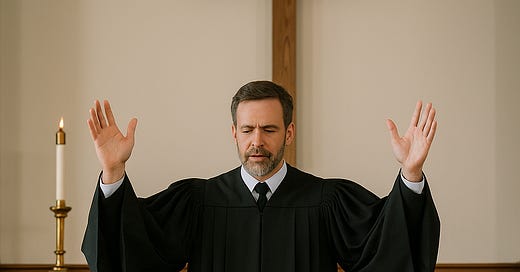Reformed worship is profoundly theological. From the Call to Worship to the Benediction, the liturgy of our services exclaims who God is, what he has done for the sake of his people, and our submission and obedience to him as Lord. Therefore, as we worship, it is good and right to acknowledge our sinfulness and be reminded of his grace and mercy towards repentant sinners.
Consider what the Confession of Sin and Assurance of Pardon articulates. First, it is a proclamation that our God is holy. In him, there is no blemish of sin or hint of darkness. He is incomprehensibly pure and wholly light. Even the angels of heaven declare the trifecta of this characteristic as they sing, "Holy, holy, holy is the Lord God Almighty!" Like the prophet Isaiah, in Isaiah chapter 6, seeing God's holiness leaves us undone. Not only are we people with "unclean lips," but we also look around us, and all we see is sin. There is a robust understanding here: God is not like us, nor is he like anything he has made. Being in his presence in worship should cause us to feel the weightiness of our sin and should cause us to come reverently into his presence with a holy fear.
Yet, this holy fear does not cause us to coward down. Acknowledging our sins, we are assured of our pardon in Christ. The Assurance of Pardon, which should always be read directly from scripture, is the moment that our hearts are uplifted in praise. This holy, holy, holy God is the friend of sinners. He is the One who does not count our iniquity against us but quiets our hearts with his love.
This grace and mercy, which have come to us in Jesus's life, death, and resurrection, fuel our thanksgiving and adoration. Christ has made us worthy to stand before the Father, and he delights in our meeting with him.
A declaration of forgiveness must follow the Confession of Sin; without it, we would be left in despair. But, praise the Lord, our sins are atoned for, and we enjoy sweet communion with our Lord!
In worshiping God, we must acknowledge this gospel experience. Once, we were enemies with God, but now the Lord Jesus calls us friends.
Confession of Sin & Assurance of Pardon
Q 27: What is the confession of sin? A: The confession of sin is acknowledgment that we are unworthy to be in God’s presence. Even though we are new creations in Christ, we continue to fall short of God’s precepts and persistently break His commandments (Lev. 26:40-42, Ez. 10:1-12, Neh. 9:1-38, Ps. 32, Ps. 38:18, Matt. 6:12-14, Jms. 5:16, 1 Jn. 1:9)
Q 28: Why are we to confess our sins publicly? A: When confess our sins publicly it helps us to remember that we are not alone as Christians. Together, as sinners saved by grace, we are acknowledging that our God is holy and we are not. (Lev. 26:40-42, Ez. 10:1-12, Neh. 9:1-38, Ps. 32, Ps. 38:18, Matt. 6:12-14, Jms. 5:16, 1 Jn. 1:9)
Q 29: What is the assurance of the forgiveness of sins? A: The assurance of the forgiveness of sins, sometimes called the assurance of pardon, is the scriptural proclamation that God mercifully passes by the sins of His people in Christ. (Mk. 2:5, Acts 5:31, Acts 10:43, 1 Jn. 1:9, Rom. 8:1-3, Rev. 1:5, 1 Pt. 1:18-19)
Q 30: Why is there to be an assurance of forgiveness of sins? A: There is always to be a scriptural assurance of forgiveness proclaimed so that believers can be reminded that all those who confess their sins before a holy God are pardoned from all their iniquities. (Mk. 2:5, Acts 5:31, Acts 10:43, 1 Jn. 1:9, Rom. 8:1-3, Rev. 1:5, 1 Pt. 1:18-19)



